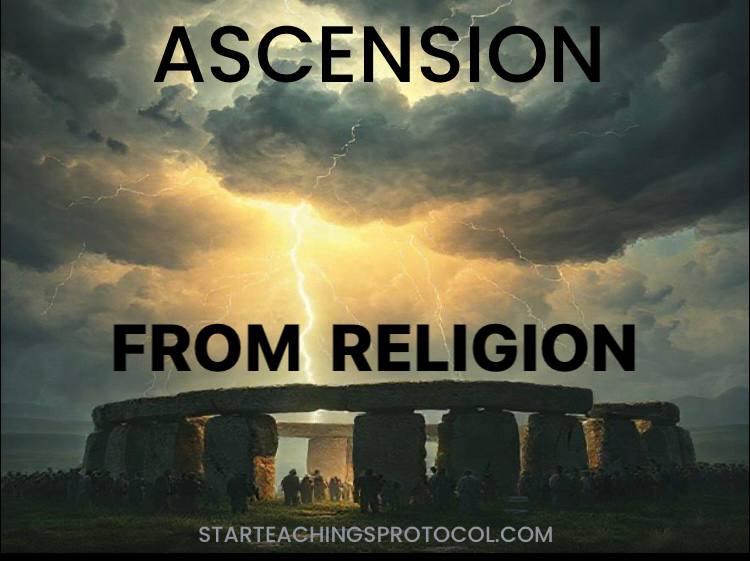ASCENSION FROM RELIGION
Ascension, or spiritual enlightenment is generally described as a state of spiritual awakening, a deep understanding of reality, or reaching a profound inner peace. It can come by way of many paths, but essentially it is a transformative process that happens in the individual upon self-realisations to a wider reality that includes their own self in context within their newly found deeper understanding.
Shared Concepts
Ascension is enlightenment, which means to be illuminated from within. As mentioned before, religion can be one of these pathways to achieving enlightenment or to be ascended. Many people of a religious belief system will have come across the concepts of ultimate intelligence, good vs evil, dark and light, the soul and unconditional love, so will be receptive to experiences and ideas that they can understand from their religious beliefs perspective.
Buddhism:
Enlightenment (known as Bodhi or Nirvana) is central to the faith. It is the liberation from suffering (dukkha) and the cycle of rebirth (samsara), achieved by following the Eightfold Path and cultivating wisdom, compassion, and inner peace. Buddhism does not believe in a one supreme god, much rather it sees the divine intelligence in all things. As a result, you can become a Bodhisattva.
Hinduism:
Enlightenment (known as Moksha) is described as liberation from the cycle of reincarnation and union with Brahman, the ultimate reality or supreme universal soul. The path involves various practices like yoga, meditation, devotion, study of scripture, and service to others. Yes, and it is encouraged that you find the path to Moksha and become free. Also, another shared concept but different name is the knowledge and belief in reincarnation, which in the Christian faith is called the resurrection.
Christianity:
The term “enlightenment” is not as commonly used as in Eastern traditions, but related concepts exist, such as salvation, union with God, or “Christ consciousness”. Early Christian mystics like St. Teresa of Ávila described a deep, personal experience of the divine presence and an inner transformation achieved through prayer and contemplation. It is also about finding the Christed light within.
Islam:
In Sufi mysticism, a path to spiritual enlightenment (Tawheed or “Oneness”) is sought through practices like dhikr (remembrance of God) and meditation, aiming for an experiential closeness to Allah.
Sikhism:
Enlightenment (Mukti) is seen as the union of the individual soul with the ultimate reality (God), attained by following the teachings of the Gurus, selfless service, and meditation.
Atheism:
The belief that there is no supreme being or god is ultimately just another religion too, excellent it is the belief that there is no “god” and that life is just a process of creation.
Diverse Perspectives
Many religions offer various paths toward a deeper spiritual understanding, though interpretations of the relationship between religion and enlightenment do vary:
Complementary Views:
Many believers see their faith as a valid and complete path to enlightenment or a similar ultimate spiritual goal, arguing that core spiritual truths are universal across traditions.
Hierarchical Views:
Some perspectives within specific religions (e.g., traditional Buddhism) may hold that other faiths can serve as “stepping stones” but may not provide the complete understanding necessary for full, final liberation from the cycle of existence. Which ironically is judgement.
Secular Views:
The historical Age of Enlightenment in Europe emphasized reason and scientific inquiry, often in opposition to religious dogma and ecclesiastical authority, leading some modern thinkers to view religion and enlightenment as fundamentally separate, or even contradictory.
See the Gnostics as an example.
Personal Journey:
Ultimately, each person’s journey is a unique and personal one, involving self-discovery and a willingness to transcend the ego and remove those unwanted worldly attachments, regardless of the specific framework that is used to do it. Releasing old ways to bring in new ways.
As a divine intelligence is there, then it will be expressed and received and understood in our own subjective unique different ways, by many people at their many different levels of understanding and consciousness.
Each of those understandings will be unique to the individual and their journey. It is not up to others to determine whether that person’s experience of the divine, and thus becoming enlightened, is any less valid than anyone else’s own personal experiences of the divine. We are each on our own paths of discovery.
💖🙏🌟

